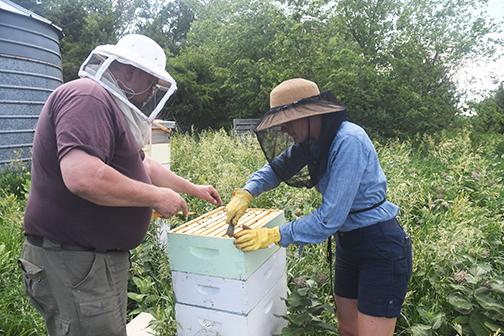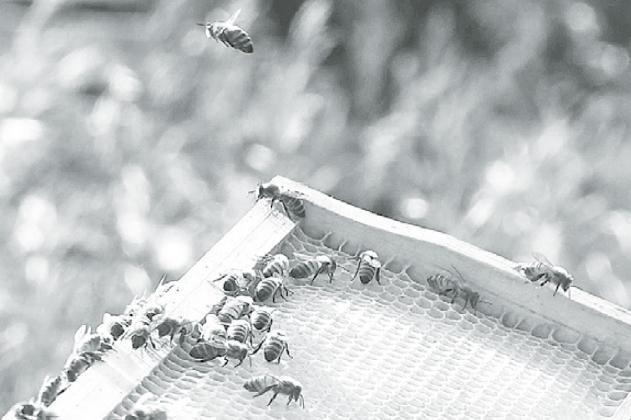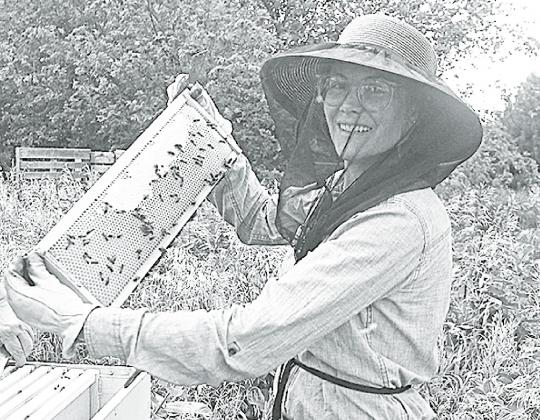Duo teaches art of beekeeping through class at CCC-GI
As many people across the country look for ways to help support nature and key species, beekeeping has become a popular option. Those who live in central Nebraska can get the latest buzz from Megan Vetter and Brian Nissen with their beekeeping class through Central Community College’s Grand Island campus.
Nissen has been teaching the class for six years and Vetter, who went from student to teacher, will be completing her first year in September.
“I got into teaching it because I’ve been the vice president of the Nebraska Beekeepers Association and I run the state fair booth,” he described. “The gal that ran the state fair booth before me asked if I would help her teach this class. I started helping her and three months later she was gone and I was teaching it by myself.”
The inspiration to form a class in Grand Island came from a demand to learn beekeeping, coupled with the fact that the closest class was in Lincoln. He noted that many classes meet for a few weeks, once monthly for a year.
Vetter took the class herself in the spring of 2016 after she took an interest in keeping bees at her home. When Nissen added on an advance beekeeping class he was overwhelmed with teaching two classes and running his farm.
“I told Judy who’s our supervisor at the college that I needed some help,” he said. “Judy and I decided we needed to con Megan into helping.”
“I said in January that 2020 is my yes year,” she added with a laugh. “It’s been different though because of our physical distancing. That makes it a brand new territory for beekeepers and educators. We’re hoping by the end of this month we can get back to the campus.”
She hopes that their beginner class can soon get back to see their hives in person. Due to the pandemic, the teachers have been hosting their classes online.
“I did a virtual meeting where I opened a hive and that was the last month for class,” Vetter noted. “I kind of explained everything I was seeing and took questions. That was cool to be able to do that, but we actually have the hives on campus and can do that with a class.”
Their year-long class isn’t bound to a classroom, which means that these teachers don’t necessarily hold office hours either.
Nissen explained that he’ll get 8-10 text messages a week from students who want to know if something is normal. Vetter added that they get questions month to month asking what’s that smell, what’s that orange stuff or where are the drones going?
“Megan and I can walk up to the front of the hive and just watch the traffic of the bees going in and out of the hive and you get a good sense of whether they’re healthy or not,” he said, “where a beginning beekeeper has never had them before. That’s what I like about the 12-month class, I can show them what a healthy hive is supposed to look like.”
When students begin the class, Vetter explained that they give the cost of beekeeping up front so that they know what to expect.
“You explain to them all the equipment that they’ll need, which is a one-time purchase,” she said. “Then we teach the biology of the bee, life cycle, swarm season, honey flow season and what to do in the wintertime. Then we teach them about varroa mite, pesticides and nutrition.”
“The class starts in November and their order of bees won’t be there until April,” Nissen continued. “So we have five classes prior to the bees arriving and we try to cram all that knowledge into their head, but tell them don’t worry if you forget some things. This is overwhelming.”
Classes also cover regulations for beekeeping in cities and etiquette for those who live in communities without regulations. He noted that one of those lessons is keeping a water source for their bees or they are liable to find the neighbor’s dog’s water dish.
“A lot of people have an irrational fear of flying, stinging insects to begin with so out of sight, out of mind is good,” he said. “You don’t want the neighbor to come out and find there are 300 bees all afternoon on their dog’s water dish.”
Local impact
When looking at what their class has done for Hamilton County, Nissen has found that there are now a lot more beehives in the area.
A big draw for their class has been the central location, as he has seen students come from Beaver Crossing, Columbus, Kearney, Anselmo and Ord.
“We cover a big area and there are a lot more bees in the area,” he said. “I know in Hamilton County alone we had at least four people take the class and keep bees.”
Nissen noted that everyone within a three-mile radius of a hive will benefit from the bees. One area that sees a boost is gardens.
“A lot of people don’t think about it, but I’ve heard people complain that they don’t get many cucumbers and the cucumbers they see are misshapen,” he explained. “You put a beehive by that garden and you’ll triple the number of cucumbers you have. The ones you see with the sides all sunken in, those seeds didn’t get pollinated.”
Vetter added that having a trained community of beekeepers close by benefits swarms of bees as well. They can be called on to rescue a swarm so people don’t exterminate them, she said.
Long-term commitment
Both Nissen and Vetter expressed that they want anyone interested in beekeeping to fully educate themselves on the risks, needs and changing landscape of their hives.
“I think every beekeeper should enroll themselves in some sort of constant education,” she said. “Anybody that wants to keep bees, it’s an investment. It’s something you have to concern yourself with all times of the year. They are livestock.”
Nissen added though that while they require the same care as other livestock, they are great for people who enjoy spending time outdoors. Those who keep bees can also work to grow different wildflowers and trees to help them have a proper diet, he said.
“One big benefit is you get your local honey and you have control over what you’re putting in the hive,” he explained. “You can have true raw, lightly strained honey that still has the pollen in it.”
Those interested in learning the art of beekeeping can reach out to the Grand Island Central Community College location to get more information.
‘I think every beekeeper should enroll themselves in some sort of constant education.’
Megan Vetter
‘One big benefit is you get your local honey and you have control over what you’re putting in the hive. You can have true raw, lightly strained honey that still has the pollen in it.’
Brian Nissen







